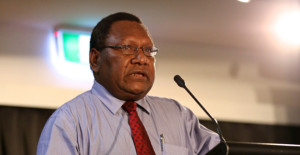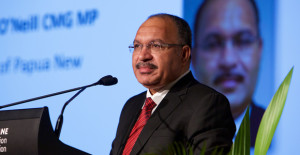The Governor of the Bank of Papua New Guinea, Loi Bakani, told this week’s Australia–Papua New Guinea Business Forum in Cairns that the bank is ‘determined’ to obtain more foreign currency ‘as soon as possible’ to address the backlog in foreign exchange demand. However, he criticised claims that PNG’s foreign exchange problem could be solved by allowing a free float of the kina, reports David James.

The Bank of PNG’s Loi Bakani
‘We are very positive about having options to support the private sector,’ Bakani told this week’s forum. ‘Once we free the backlog, that will free up the market to operate smoothly, both for the in-flows that are coming from the exports and of course to meet the normal demand for imports and service payments.
‘It is the backlog that is creating this issue for us and I think we all appreciate that we have to find a way to look at it.’
Bakani added the discussions with the IFC to provide a US dollar credit facility to PNG’s major banks are ‘ongoing’. He said the central bank is also looking at other sources ‘to address the issue.’
Economy strong

Prime Minister Peter O’Neill
Earlier, the Prime Minister Peter O’Neill had reminded the forum that the PNG economy had grown at an average of 9 per cent per year between 2012 and 2015.
‘The domestic economy of Papua New Guinea is expected to grow at a very moderate rate this year as we deal with the lower commodity prices that we are experiencing.’
He reassured delegates that ‘experiencing lower commodity prices is not going to last forever.’
Bakani confirmed the strong fundamentals of the PNG economy.
He said PNG had experienced 14 years of positive GDP growth, adding that between 2010 and 2015 GDP grew by over 69 per cent.
He rejected the suggestions of ‘some commentators’ that the increase in GDP is inflation-driven saying that, over that period, real GDP (after inflation is taken into account) grew by 59 per cent.
‘What is this rate? What is the evidence you have for this market clearing rate today?
Bakani said that, based on new numbers from the Bank of PNG and Treasury, the ratio of government debt to GDP had been revised down to 27 per cent of GDP for 2014, and 28 per cent of GDP for 2015.
He said that, because of the growth in the economy, ‘there is a lot of space for government’ to ‘stay within the limit of 35 per cent or 30 per cent (debt-to-GDP ratio).’
Free float?
Bakani was critical of commentators who argue that a free float of the kina would solve PNG’s foreign exchange problem. He pointed out that the kina had depreciated significantly since 2012.
‘A depreciation of such magnitude is a clear reflection of the supply–demand situation. Some commentators are of the view that the kina should be freely floating to reach a market-clearing exchange rate.
‘What is this rate? What is the evidence you have for this market clearing rate today?
‘Given the fact that PNG is an import-dependent country, the kina has depreciated significantly. We know that the supply-and-demand responses to the depreciation of the kina are very, very low. It is therefore very difficult to know what exchange rate will clear the market.
‘It is really an issue that the inflows are lower than the outflows. Basically the supply of foreign currency is lower than the demand.’
‘The central bank’s role is very difficult. It has to tread a fine line between movements in the kina exchange rate, and it also has to maintain its objective of price stability [for the national currency]. That is a dual objective of managing an exchange rate.’
Bakani noted that the government is not heavily exposed to foreign debt markets; PNG’s foreign debt burden is ‘negligible’. He observed that the foreign debt PNG owes has ‘low interest rates and long grace periods, on both the interest and principle repayments.’
Sentiment
Bakani told Business Advantage PNG the current state of PNG’s currency does not just reflect fundamentals, but also market sentiment.
‘The fundamentals of the economy are strong,’ he said. ‘Sentiment is driving the short term issues that we have now. It is also an issue that the inflows are lower than the outflows. Basically, the supply of foreign currency is lower than the demand.
‘After the debt service and accelerated appreciation are over, there will be more foreign exchange inflows from the LNG project.’
‘That is why central bank governors have to take time out to try to explain it. These are very complex issues.’
LNG revenues to come
Bakani added that the PNG LNG project is not producing tax revenue for the PNG Government at the moment due to tax deductions due to accelerated depreciation.
‘There is a time period when the accelerated depreciation will go down, and a time when the revenue will go up, and at that point the tax comes on. After the debt servicing and accelerated appreciation are over, there will be more foreign exchange inflows from the LNG project.’
According to International Monetary Fund estimates, ‘significant’ tax revenues from the PNG LNG project are not expected before 2021/22.








Speak Your Mind